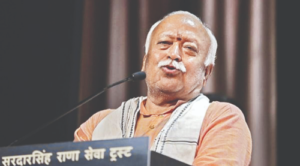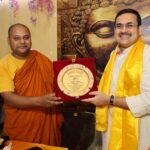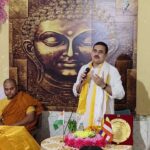3852yssmm5rdwm2tznbtzd8qqvk7gldwzyda0239613
“Society has to make arrangements (vyavastha) for them, one can cannot neglect or stigmatise them”, RSS chief Mohan Bhagwat replied when the question on LGBT rights and Section 377 was read out to him on the third and final day of his address in Delhi’s Vigyan Bhavan. Bhagwat was concluding what was, unarguably, an unparalleled outreach in the annals of the RSS.
It was a reaching out which was frank, exhaustive and which, without circumventing hard questions, articulated the Sangh’s positions on crucial issues of the day. It was an exercise of articulating a larger, contemporary narrative of the Sangh. Coming in the backdrop of the raucous attacks against it, the RSS’s initiative was timely. Not that the effort sprung out of the sole necessity of the Sangh to defend itself or to justify its position because of political and ideological opposition to it; the exercise was perhaps more inspired by the idea of articulating its position on current sociocultural and political challenges.
RSS chiefs in the past have addressed and continue to address adherents in large gatherings, but such a sustained, no holds barred presentation of the Sangh, made by its top office bearer, to those who usually hold a marginal or outsider’s view of the organisation, whose knowledge and understanding of it are based on hearsay, was a first of its kind.
Like the Sangh’s participation in the Republic Day parade of 1963 at the invitation of Jawaharlal Nehru — an episode that Nehru’s great grandson appears to be oblivious of — Bhagwat’s Vigyan Bhavan outreach and his engagement with a wide cross section of the intelligentsia, both national and international, will go down in the history of the Sangh, and that of post-1992 India, as a watershed event.
That the chief of the largest sociocultural organisation of India, if not the world, which has had a decisive impact on the evolution of India’s polity, after Independence, stood in an open forum, before a mixed audience, in which the believers were fewer than those who were not, and explained the details and intricacies of his organisation has set a precedence, which, I am afraid, the critics of the Sangh will not be capable of emulating. The shoot and scoot method, which is antithetical to public dialogue, is what suits them better; it helps in perpetuating their shallow politics and false propaganda. The Sangh has been calling for evolving a healthy trend of public dialogue among different groups and institutions on crucial issues of the day.
Read more
No Hindu rashtra without Muslims, Hindutva based on unity in diversity: Mohan Bhagwat
Mohan Bhagwat explains RSS’ stance on cow protection, conversion, quota, Section 377 and other issues
Among the many positions elaborated by the Sarsanghchalak, there were some that were striking. For example, the Sangh, Bhagwat pointed out, believes in evolving its positions on various issues from time to time. It is not an intellectually calcified outfit, or an organisation that is run by diktats. It does not function in a time warp. Referring to some of the views and writings of the second RSS chief, Guruji MS Golwalkar, Bhagwat had the clarity to say that they must be read in the context of the time in which they were articulated. “There is a lot that continues to be universal in Guruji’s works and thought, it is to those that we need to turn to,” he said. Such candidness is absent in those who keep throwing up Golwalkar’s booklet, We, Our Nationhood Defined, a work that the Sangh has itself long ceased to refer to. In fact, the critics of the Sangh have never displayed the gumption to revise their own ideological and political positions lest they be castigated as revisionists and reactionaries by their own. The reason for the Sangh’s uninterrupted 92 years of evolution, its expansion and continued relevance, is precisely because it has been able to continuously evolve.
The inclusiveness of Hindutva, Hindu Rashtra with Muslims as integral constituents, faith in a common ancestry for all, the commitment to social equity — Samajik Samarasta, the need for caste based reservations for bringing about this equity, the equality and empowerment of women, the inherent faith in the Indian Constitution, the RSS never having done anything which goes against the spirit of the Constitution, the need for building the Ram Mandir in Ayodhya so that it would end all dispute and misunderstanding between Hindus and Muslims, the dishonesty of forced and induced religious conversions, the need for the law to catch up with those indulging in lynching, the need for gau raksha as a constructive effort, and the need for everyone to contribute their positive energies for India’s well being and growth, were some of the unequivocal and fundamental positions that emerged from Bhagwat’s addresses.
It was a bold exercise, shorn of rhetoric and devoid of polemics; will the RSS’s critics now have the grace to introspect and to engage in a similar exercise?
Anirban Ganguly is the director of the Syama Prasad Mookerjee Research Foundation (SPMRF), New Delhi, and a member of the Policy Research Department of the BJP
The views expressed are personal
First Published: Oct 02, 2018 18:51 IST
tags
Sangh Mohan Bhagwat Vigyan Bhavan Jawaharlal Nehru India rss outreach
more from analysis
Swachh Bharat Mission needs long-term commitment
We need more than a grievance officer to curb fake news
by TaboolaSponsored Linksyou may like
18-year-old farmer is fighting death, he needs your help.
Ketto
A Proven Way to Sharpen Young Minds
Magic Crate
Why you should buy a Term Insurance Early in Life?
Coverfox.com
PG Diploma in Machine Learning & AI. Prepare for the future job wave!
Amity Online
Stock Clearance On Rado, Tag Heuer, Omega Discount Of 80%
Wrist Zone
The Biggest Idiots In The Tech Industry
Hotstar Premium
editor’s pick

















